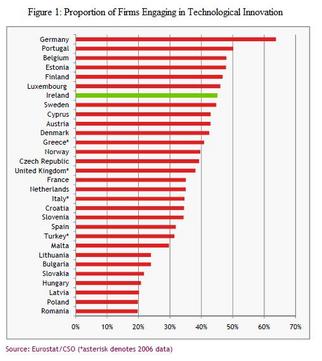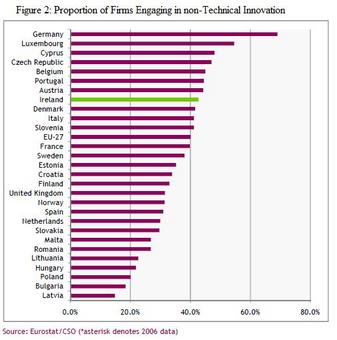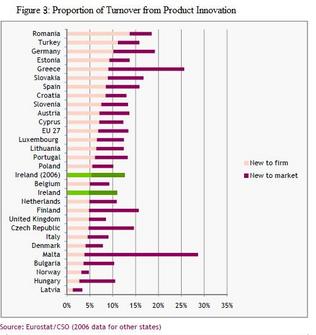This suggests that Ireland may not be capitalising on the innovations it introduces. We are introducing new products, processes, organisations and marketing changes at a rate almost matching the EU leaders, however, when it comes to commercialising these innovations we are falling behind. This may suggest more of a role to play for government support in getting innovations to market and ensuring that the innovations achieve access to the desired markets to support growth.
|
A recent report by Forfàs indicates that Ireland’s innovation performance is growing strongly. According to data from the EU wide Community Innovation Survey (CIS), displayed in Figure 1 below, Ireland is ranked 7th out of all EU member states in terms of the proportion of firms which perform technological innovation. The report defines a technological innovation as the introduction of a process or product innovation and discounts organisational or marketing innovation. Germany leads in terms of the proportion of firms engaging in technological innovation; with 63.8 percent of firms reporting that they introduced a new technological innovation during the reference period 2006-08. When considering organisational and marketing innovation (defined in teh report as non-technological innovation) it can be observed that Ireland is ranked 8th out of the EU countries. However, when analysing the effective commercialisation of these innovations Ireland’s performance falls down. Figure 2 displays the proportion of turnover derived from new to market and new to firm process innovation. It can be seen that Ireland’s position is quite low down the rankings and indeed it has even fallen since 2006. This fall may be unsurprising given that the total turnover of a substantial proportion of firms has fallen. The proportion of turnover derived from product innovations can be used to assess whether new innovations are perhaps more resistant to downward pressure on sales than traditional, older products. However, the data presented in the Forfàs report fails to provide support for this; instead suggesting innovation sales have fallen.
This suggests that Ireland may not be capitalising on the innovations it introduces. We are introducing new products, processes, organisations and marketing changes at a rate almost matching the EU leaders, however, when it comes to commercialising these innovations we are falling behind. This may suggest more of a role to play for government support in getting innovations to market and ensuring that the innovations achieve access to the desired markets to support growth.
0 Comments
Leave a Reply. |
AuthorJustin Doran is a Lecturer in Economics, in the Department of Economics, University College Cork, Ireland. Archives
December 2017
Categories
All
|



 RSS Feed
RSS Feed
